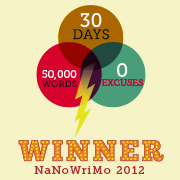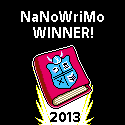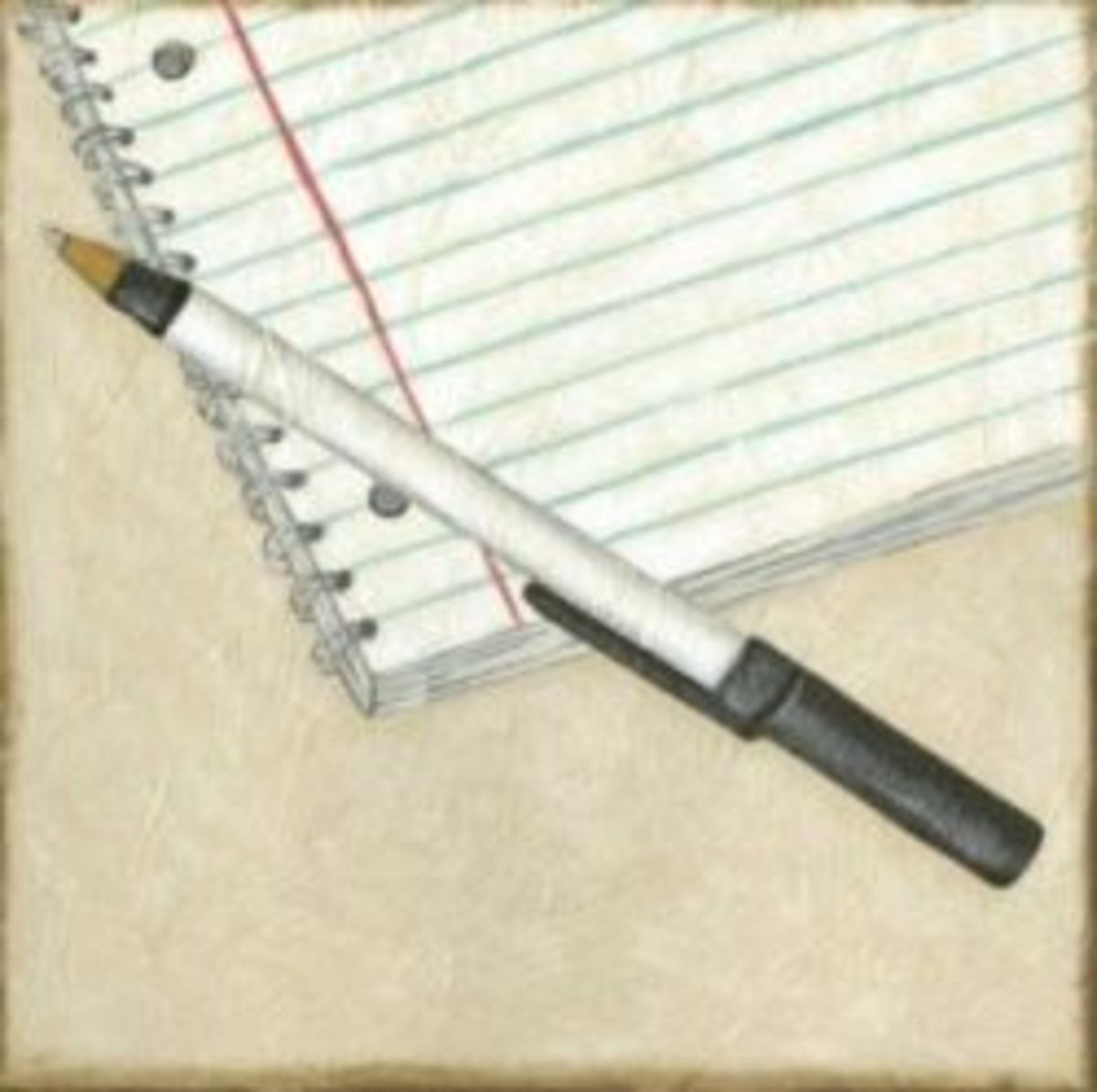A Guide for NaNoWriMo

So, you’ve decided to take the plunge and participate in NaNoWriMo, a.k.a. National Novel Writing Month. The challenge is relatively straightforward; write a 50,000 word novel in thirty days. Though, despite the ease of conveying that challenge, completing it is something else entirely. I know of some writers who managed to pull it together, and others who fell from the sky in a blaze of plot holes and lost characters. I had never personally participated in NaNoWriMo until 2012. Before that, I would use the surge of writing mojo to edit my then-first-novel in large chunks. While it was a valuable tool, ultimately I still wanted to attempt the challenge. I did complete it that year and it was a wildly fulfilling experience. But, I do want to stress that NaNoWriMo should be used more to ignite writing than a strict outline of what you have to do. I say this because, even though I hadn’t participated until 2012, the boost it gave me, during the editing of previous books, was invaluable to my progress. November should be a time to encourage all writers to pick up that project again in addition to, or other than, starting something new. Don’t think that you’re restricted.
With this in mind, I’ve compiled a number of my guides that I think will be helpful to new and old writers alike, specifically for NaNoWriMo. Hopefully, whatever area you might be struggling with, will be helped along by one of the articles below. I’ll include a description for each to help you narrow down your points of interest. And, as always, keep writing!
(Jump to the end for some additional tips I learned from my experiences with the challenge.)

The Basics:
How to Seriously Write a Novel
Persistence, perseverance and patience; the three P’s of novel writing. Countless books and classes can teach the intricacies, but I try to focus on the basics of getting it off the ground. Everyone will have methods that suit them best, but hopefully I can point you in the right direction.
A Guide to Crushing Writer’s Block
“This is great, I’m on a roll. I’ll be at 50,000 words in no time. Oh, wait, who is this new character that just walked in? Their name is… um… John Doe? Crap, I lost it.” There are a lot of things that can kill momentum in your story, but it needn’t derail your entire NaNoWriMo project. In this guide I focus on some ways to deal with the monster known as writer’s block.
A Guide to Creating Interesting Fictional Characters
I can’t promise that the actors who inevitably portray your characters will win Oscars. But, at the very least, I can help you build them out a little more. Some things will be time consuming, like backstory, and some things are just overlooked, like hair color. Either way, I provide a template to help get you started.
How to Motivate Yourself to Write
“I don’t want to write today. Or tomorrow, or the next day. Oh dear, I’ve started an unhealthy trend.” While NaNoWriMo is great for motivating us to write again, sometimes we need more to kick our butts back into action.
How to Seriously Edit your Writing
Okay, well this one isn’t as essential for NaNoWriMo. In fact, one could argue that editing will only slow you down. I agree, but I assume that you’re writing a novel for a reason and will have to edit it eventually. Let’s bookmark this one for later.
For Genre Fiction Writers (Fantasy, Science Fiction, Horror, etc.):
How to Write Genre Fiction for Beginners
Hopefully, if you’re planning to write genre fiction, you are somewhat familiar with it already. But don’t panic if you’re not. In this guide, I focus on some of the things that separate these genres from other forms of fiction, in order to give you a map of how to begin.
How to Write Your Own Creation Myth
I suppose you could use this for traditional fiction as well, but when you are dealing with fantasy worlds, writing a creation myth is a crucial piece of the lore. However, the process isn’t as daunting as some might think. Plus, if you incorporate the myth into your novel, then you can count it towards your NaNoWriMo total.
How to Describe a Fantasy City
There are a few things that I’ve focused on for genre fiction writing. One of those is describing a fantasy city. It’s easy to assume that your readers know the genre as well as you do, but chances are they don’t. Inside, I ask the important questions, to see if you know your city as well as you think you do. Your resulting answers will, hopefully, show you where you need to add description.
How to Describe a Fantasy Creature
This was another area I zeroed in on. Sure, most people know, roughly, what a dragon looks like, but if you’re only using dragons, then you might want to spice things up a bit. Creating original creatures can be fun, but don’t shy away from describing their every disgusting detail.

Some Inspiration:
Quotes to Inspire your Writing
Collecting quotes is a hobby of mine and a number of them can be applied to the writing craft. I find myself coming back to these quotes when my motivation is wandering off. Come to think of it, these should really be a part of the article about motivating yourself to write.
My Struggle Writing an Epic Fantasy Novel
One of the things I find helpful, as a writer, is reading about the struggles of other writers. It makes me feel like part of a larger career, rather than a solitary author in an ocean of rejections. With that in mind, I wrote a series of articles chronicling my journey writing an epic fantasy novel.
How to Seriously Write for Yourself
Depending on what you intend to do with your NaNoWriMo novel, you may find that your writing is gravitating too heavily towards publishers and/or an intended audience. Sometimes we just need to break away from that and write to our personal dreams or sick fantasies. Interestingly enough, these tend to be more interesting stories than the ones we wrote for other people!
Why You Should Write with at Notebook instead of a Computer
I put this under the inspiration category because it’s the fastest way to eliminate distractions around you. During November, you’ll likely be attacked constantly by facebook, twitter or whatever other social networking site that eats away at your productivity like a disease. Take my advice and cut the internet cord. Grab an old fashioned notebook and pencil and hide in a corner until you meet your daily word goals.
Conclusion
The most important thing about participating in, and completing, NaNoWriMo is setting attainable goals. I believe the per-day requirement, to finish on time, is something like 1,600 words, but don’t be disappointed if you don’t reach it some days. While authors will have to contend with deadlines in the future, right now just worry about making any amount of progress. Even 1,000 or 500 words per day will make for an impressive achievement come December 1st. So, grab yourself a cup of coffee, hammer out what you can, and have fun with it. One of the neat things about this event is that it’s a way to bring all these solitary writers together for a month-long bash each year.
You can join the rest of us crazy writers at www.NaNoWriMo.org where you can track stats on your budding novel.


Additional Tips
- Watch out for holidays. If you usually go away to visit family for Thanksgiving, you might not have that time to write. Plan ahead.
- While I usually recommend writing with a notebook, writing with a computer is a faster way to reach your word goal.
- Try not to edit as you go. It slows your momentum and can lower your word count.
- Set aside the same time every day for writing. Making it a routine helps you stay on track.
- Writing with a friend/relative/spouse can also help you stay on track. It is also fun to share what you've just written to maintain interest in the story.
- Save often and backup your files after every writing session.
- Prep your book before November. Hammer out the basics like character profiles, plot points, and themes in September and October. Having to fill this information in on-the-fly kills momentum and interest.
- Try not to constantly check your word count as you're writing.
- Don't be afraid to write crap.









